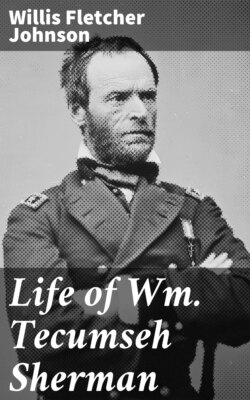Читать книгу Life of Wm. Tecumseh Sherman - Willis Fletcher Johnson - Страница 15
На сайте Литреса книга снята с продажи.
CHAPTER X.
OFFICIAL REPORTS ON SHILOH.
ОглавлениеTable of Contents
Sherman's Own Story—How his Troops were Posted—The Attack—Troops in Disorder—Grant and Buell at the Bivouac—The Battle Resumed in the Morning—Death of General Johnston—Gallant Conduct of Individual Officers—Grant's Official Report—Special Mention of Sherman for his Gallantry as a Soldier and his Skill as a Commander.
Few battles have been more discussed, or more vigorously discussed, than that of Shiloh, or Pittsburgh Landing. In these often acrimonious controversies, Sherman himself took a leading part. It is doubtful if an agreement as to the facts in the case can ever be reached; certainly the flood of argument, narration and abuse that has been poured forth has not materially tended toward such a settlement. The chief point at issue is, whether or not the Federal officers, especially Sherman, were surprised by the enemy. That they were, and that they were not, have both been stated and restated with every possible accumulation of emphasis. Perhaps it will best serve the present purpose to rehearse here, side by side, two narratives of the battle, both written at the time and on the spot, the one giving, in his own language, Sherman's account of the battle, the other the account written by one of the ablest newspaper correspondents in the war.
The gist of Sherman's own report, addressed to Captain Rawlins, Grant's Assistant Adjutant-General, was as follows:
"I had the honor to report that on Friday, the 4th instant, the enemy's cavalry drove in our pickets, posted about a mile and a half in advance of my centre, on the main Corinth road, capturing one First Lieutenant and seven men; that I caused a pursuit by the cavalry of my division, driving them back about five miles, and killing many. On Saturday the enemy's cavalry was again very bold, coming down to our front; yet I did not believe he designed anything but a strong demonstration. On Sunday morning, early, the 6th instant, the enemy drove our advance guard back on the main body, when I ordered under arms all my division, and sent word to General McClernand, asking him to support my left; to General Prentiss, giving him notice that the enemy was in our front in force, and to General Hurlbut, asking him to support General Prentiss. At this time, 7 A. M., my division was arranged as follows:
"First Brigade, composed of the Sixth Iowa, Colonel J. A. McDowell; Fortieth Illinois, Colonel Hicks; Forty-sixth Ohio, Colonel Worthington; and the Morton Battery, Captain Behr, on the extreme right, guarding the bridge on the Purdy road, over Owl Creek.
"Second Brigade, composed of the Fifty-fifth Illinois, Colonel D. Stuart; Fifty-fourth Ohio, Colonel T. Kilby Smith; and the Seventy-first Ohio, Colonel Mason, on the extreme left, guarding the ford over Lick Creek.
"Third Brigade, composed of the Seventy-seventh Ohio, Colonel Hildebrand; Fifty-third Ohio, Colonel Appler; and the Fifty-seventh Ohio, Colonel Mungen, on the left of the Corinth road, its right resting on Shiloh meeting house.
"Fourth Brigade, composed of the Seventy-second Ohio, Colonel Buckland; Forty-eighth Ohio, Colonel Sullivan; and Seventieth Ohio, Colonel Cockerill, on the right of the Corinth road, its left resting on Shiloh meeting-house.
"Two batteries of artillery, Taylor's and Waterhouse's, were posted, the former at Shiloh, and the latter on a ridge to the left, with a front fire over open ground between Mungen's and Appler's Regiments. The cavalry, eight companies of the Fourth Illinois, under Colonel Dickey, were posted in a large open field to the left and rear of Shiloh meeting-house, which I regarded as the centre of my position. Shortly after seven A. M., with my entire staff, I rode along a portion of our front, and when in the open field before Appler's Regiment, the enemy's pickets opened a brisk fire on my party, killing my orderly, Thomas D. Holliday, of company H, Second Illinois Cavalry.
"The fire came from the bushes which line a small stream which rises in the field in front of Appler's camp, and flows to the north along my whole front. This valley afforded the enemy cover, but our men were so posted as to have a good fire at him as he crossed the valley and ascended the rising ground on our side.
"About eight A. M. I saw the glistening bayonets of heavy masses of infantry to our left front, in the woods beyond the small stream alluded to, and became satisfied for the first time that the enemy designed a determined attack on our whole camp. All the regiments of my division were then in line of battle, at their proper posts. I rode to Colonel Appler, and ordered him to hold his ground at all hazards, as he held the left flank of our first line of battle, and I informed him that he had a good battery on his right and strong support in his rear. General McClernand had promptly and energetically responded to my request, and had sent me three regiments, which were posted to protect Waterhouse's battery and the left flank of my line. The battle began by the enemy opening a battery in the woods to our front, and throwing shell into our camp.
